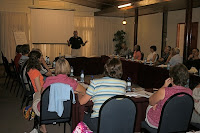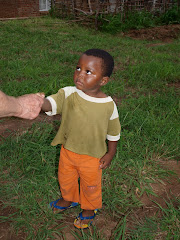If you had your ear to the ground around the time of the Kenyan presidential election in 2007, you will have heard of the horrible inter-tribal violence that took place across the country in the aftermath of the election in December of that year.
We were in Kenya six months later where we met and spoke with people who had been impacted in one way or another by the violence.
We stood in the ashes of a burned down church where women and children who had gathered there for safety and protection had been burned alive. We stood and looked down at the mute evidence of those lives … small pieces of clothing with burn marks that showed where the flames that had consumed the rest had ended … the burned remnants of childrens’ shoes … arbitrary house keys lying in the ashes.
Later, as we sat in the boardroom of Daystar University, we heard how a dazed group of pastors from local churches had confessed that they had actually been involved in perpetuating some of the violence.
It was as if they had woken up from a dream, and couldn’t understand what had happened. They had come to say, “Please help us understand why we were killing each other.”
We sat with brilliant scientific researchers from universities in the States who were with us on the trip and listened as they interacted with their Kenyan counterparts about how to respond.
I listened with a pastor’s heart and began to reflect on the fact that while research is valid and even needed, the main thing was being over-looked. The issue is a deeply spiritual one, as far as followers of Christ are concerned. The great commission does not just demand great conviction. It ALSO requires great compassion.
If we’ve never understood, “As the Father has sent me, so send I you,” we need to understand it now in the face of the horrors resulting form the AIDS pandemic across Africa.
In the weeks and months that followed that meeting, I reflected on the decades we had been involved in evangelism and church planting in Zimbabwe. I reflected on how passionate we were when it came to discipling followers of Christ on the theology of conversion, but wondered if we had been diligent enough when it came to the theology of compassion.
I went back to the Book, and was astounded to realize more than I had ever realized before, how much of Christ’s earthly ministry was taken up by reaching out and touching hurting people.
Throughout our career, we have been driven by the necessity of sharing the Gospel message to people who needed to hear it so that they, having embraced it, could take it to others who hadn’t heard it yet. That passion remains.
But now, we feel equally driven by the necessity of demonstrating and teaching the compassion of Christ in a world of people that so desperately need it.
I honestly wonder whether our culture of Christianity has distorted our view of the Christ whom we claim to follow. It’s not enough to say what He said. I’m convinced that his heart is grieved when we don’t do as He did. That too is part of the mandate He left us.
Then, as I looked at the history of the global response to what I refer to as Africa’s predicament, I was equally challenged.
Poor people die in Africa not because of the world’s indifference to their poverty … and the ills that poverty brings … but also because of well intended yet ineffective efforts on the part of well meaning outsiders looking in.
HIV initiatives in Africa are a dime a dozen. Most of these involve the development of a “project” that is then planted in a given location with varying degrees of cultural adaptation and use of local resources.
These have met with varying success, require large amounts of money and rarely survive eventual nationalization of the program with its accompanied tapering of external resource input and accountability.
At best these programs impact one or two of the of the amazingly diffuse number or problems associated with the HIV crisis (orphans, treatment, child led homes, education, prevention etc., etc., etc.).The net result is less than a blip on an incidence curve that is spiraling out of control.
There is, however, one exception in Africa. Uganda was the first African state to report HIV infections of an epidemic proportion. It is also the first nation in Africa to demonstrate not only a slow down in the number of new infections annually, but an actual decrease in the number of HIV infected cases.
It happened slowly, because there was no catalyst to speed up the natural gradual process, but it happened.
Even the Ugandan government openly states that this turn around was due to the involvement of the Church, not one building or one congregation but tens of thousands of believers in multiple congregations, all across the country. It started small with one person here, another person over there saying, “enough is enough, something has to be done!” Individuals started, others gathered around them and eventually whole churches got involved.
The initiatives varied from poor widows impacting child led households in their communities to sophisticated schools for orphans, feeding programs and treatment centers. Some aligned themselves with official government programs exponentially expanding their effectiveness, while others stayed small and focused.
Eventually, many aligned themselves with churches in the West, not only increasing their own effectiveness but impacting the western churches in ways their leaders could only have dreamed of.
The things we witnessed during the time we spent in Zimbabwe earlier this year proved to us that Africa is changing. Zimbabwe is changing. The old “I don’t want to get involved” attitude is being replaced by a desperate desire on the part of poor people to do “something”, “anything” to ease the pain and suffering around them.
African church leaders are coming to their missionary counterparts begging for help and advice. It is into this scenario that we have introduced our HIV/AIDS initiative.
We are not interested in a well-developed program that can be plopped down in the center of Zimbabwe. We want to be a simple, unobtrusive catalyst.
Someone has said, “We can either look at the HIV epidemic as the worst medical disaster to hit the earth since the Black Plague or see it as the greatest opportunity Christ has given His Church to demonstrate His love to the to the disenfranchised and marginalized sectors of global society since Christ Himself walk on this earth.”
A Sample Vignette
There is an elderly widow woman in the Eastern highlands of Zimbabwe who was reaching out to teen led homes in her community with the little she has herself.
Twenty years ago we heard stories of grandparents in Africa having to raise their grandchildren because of parents who had died of AIDS.
Today the situation is far worse. Now, a generation later, those grandmothers have died, many of the grandmothers who were to have replaced them have died from AIDS, the parents have died and the small children are left to themselves, teens and even pre-teens have been saddled with the responsibility of not only caring for themselves but raising their younger siblings as well.
In one small village this elderly widow could no longer sit back and ignore the plight of the teen led homes around her. Beginning with the closest home she committed to visit them at least once a week, bringing food when she could, which was not often.
When she visits these orphan led homes, she teaches the young children how to cook and keep house, gives instructions to the older children among them how to run a home. She models how to plant and care for their small garden, and teaches the youngest among them how to read.
She ends her time with them each visit by reading from the Bible and praying with the children, giving expression to the love of God that causes her to reach out in love. The children have grown to love her and look eagerly forward to her visits.
She added homes to her list until she was visiting five homes every week. Realizing that she had reached her limit, yet driven by the enormous need, she has enlisted ten of her widow friends, teaching them to do as she has done.
Now, through the efforts of a single widow woman 55 homes in this small community are receiving mentoring and a clear picture of Christ’s love.
This is a true story and is just one example, one of many points of light, springing up all over Africa.









-2.jpg)
-4.jpg)
-3.jpg)
-11.jpg)
-12.jpg)
-13.jpg)
-21.jpg)
-19.jpg)





